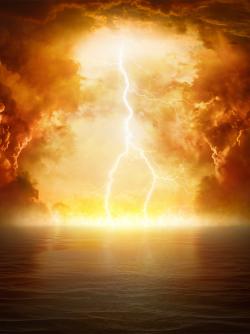War of the Worlds
Decades after the famous novel, the Middle East is living a real conflict involving an aggressor as uncompromising as H.G. Wells’ otherworldly invaders.
The War of the Worlds portrayed the invasion of our world by aliens from the planet Mars. Written and set in England’s Victorian era, this famous novel by H.G. Wells was later adapted to radio and graphically depicted by Hollywood screenplays. The first movie based on the novel, produced in 1953, became recognised as a cultural icon shaping future science-fiction films.
We are all aware of the barbaric onslaught by the forces of Hamas against Israel on October 7, 2023. Today, we really are witnessing a real, growing world conflict involving an aggressor in every way as uncompromising in its goal as those otherworldly invaders of Wells’ story—and a sovereign state as unable to give in to such enemies’ demands as the besieged earthlings facing genocide. And the religious cause, the driving ideology, is just about as alien to Western minds as Martian invaders. The conflict has no political solution—only a religious conclusion.
May brings us to the seventh month since the October 7 Hamas attack. The reaction to these months of war has been marked by the Western world’s emphasis on human rights for the Palestinians. Western policymakers and pundits see the solution to the problems in terms of political theory.
Since the French Revolution and the establishment of the United States, the Western world has increasingly judged events in terms of human rights. The 1947 United Nations partition of the land called Palestine was driven by this political ethos. The establishment of the state of Israel a year later was similarly political (see “Jerusalem: The Way Forward” in the November–December 2023 issue of Tomorrow’s World).
Uncompromising Enemies of Israel
Fast-forward to October 7, 2023. The invasion of Israel by the forces of Hamas was not simply a political event. Hamas has no interest in human rights as defined by the West, but rather seeks the establishment of an Islamic state including the area now called Israel. For Islam, politics is necessarily subservient to religious goals, and for many Islamists a key goal is to deny Jews the right to live in Israel. The Houthis in Yemen and Hezbollah in Lebanon, who wish to involve themselves in the current conflict on behalf of the Palestinians, see a struggle for religious dominance, not for human rights.
Polls taken in Gaza and the West Bank all show overwhelming support for Hamas and its action of October 7. The population there has been “educated” to desire the destruction of the state of Israel—and the outcome of such destruction would be an Islamic state, not a democratic one.
Iran, the primary benefactor of Hamas, is also misread by most in the West. The fall of Shah Reza Pahlavi’s regime in the late 1970s is still seen as the failure of the Shah to Westernize that country quickly enough. In fact, the reverse was true; he Westernized Iran so quickly that the traditions of its Shi’ite Muslim heritage were on the edge of being destroyed. The subsequent reign of the Ayatollahs has reestablished that heritage. It is not Westernization that they seek, but rather Islamic hegemony.
Hence, ceasefires and peace settlements between Israel and Hamas as defined by Western minds have little value. For Hamas and its axis, such delays simply provide a breathing space to prepare for the next onslaught.
The Western world displays great ignorance of this as it seeks to renew the concept of establishing a Palestinian state in response to the attacks of October 7. A Palestinian state—the so-called “Two-State Solution”—will not prevent a repeat of October 7. Hamas has controlled the Gaza Strip since 2006, sometimes allied with and sometimes contending against the secular Fatah faction. Its influence has effectively and deliberately prepared the Strip for ongoing conflict with Israel.
A newly independent Palestinian state would not bring peace—it would bring yet another player into the religious conflict, which, like Hamas, would be established with the sole goal of driving Israel and the Jews out of the Middle East and preferably destroying both the state and its people in the process.
Israel in Danger More than Ever?
Several factors must be considered to fully understand the situation today.
First, the establishment of the state of Israel in 1948 was a blow to Muslim aspirations, establishing another dominant religious force in the form of Zionist Judaism. To the Islamic mind, this was a setback. With the establishment of the state of Israel, the Jews went from being underlings in the Arabic world to holding an advantageous and controlling position. The Israeli victory in the 1948 Arab-Israeli War heralded a new power in the Middle East.
Though small Jewish communities had flourished for centuries throughout the Arab world, they had no sovereign status, despite a certain degree of freedom to follow their religion. They were subject to persecution and enjoyed little in terms of human rights. With the establishment of the State of Israel, these communities within Arab nations became subject to increased persecution to the point where Jews had to emigrate to Israel or other Western nations for safety. The servant of long standing had risen to become master in the region. Across the Arab world, the continued existence of the Israeli state is a galling reminder of defeat.
In this regard, on January 14—a hundred days after the October 7 attacks—a spokesman for the al-Qassam Brigades described the motive behind the attacks as “the start of [Israel’s] actual temporal and spatial division, and the ‘bringing of red [heifers] as an application of a detestable religious myth designed for aggression against the feelings of an entire nation in the heart of its Arab identity’” (The Palestinian Chronicle, January 14, 2024). The modern search for a red heifer is linked to the anticipated rebuilding of the Third Temple in Jerusalem, as it is considered necessary for purification rituals associated with temple worship.
Another important piece of context that we need in order to properly comprehend the current situation is that the modern state of Israel was undoubtedly established as a Zionist enterprise. The intention of its founders was to create a safe place for Jews so that they would no longer be subject to the pogroms that roiled Europe in the nineteenth and early twentieth centuries—they would be safe from the predations of nations so that an atrocity like the Holocaust could never happen again.
October 7 destroyed the vision of Israel being a safe place; the deaths recorded on October 7 were the largest numbers of Jews killed in one day since the Holocaust itself. Israel now faces existential questions about its place in the world. The question of whether Israel is a state for Jews or a Jewish state becomes more pressing.
Zion, Zionism, and Bible Prophecy
Where does that leave the Zionist state going forward? Will the current challenges bring a renewed sense of religious zeal amongst Israel’s leaders to more overtly observe Jewish religious practices? Synagogue attendance saw an upsurge following October 7. Ultra-orthodox and far-right political parties made gains in February’s local elections.
Indeed, religious Jews have become much more involved in Israeli politics since the 2005 disengagement from Gaza ordered by then-Prime Minister Ariel Sharon, which led to the development of right-wing religious political parties that are now part of the government. These parties will naturally want to exert influence over what happens to Gaza going forward. Should it once again be part of the land of Israel—Eretz Israel, as they perceive?
And the perennial question of military service exemption for Orthodox men enrolled in yeshivas—Torah study halls—takes on a new dimension. Presently, some 15 percent of the population can avoid military training and call-up by claiming this exemption. Yet at least 2,000 of these have signed up for military service since October 7, while groups of ultra-Orthodox Jews, Haredim, have willingly provided useful support for the military action. Wives of Haredim have been instrumental in establishing kitchens to provide kosher food to those serving in the military.
An ancient book that the secular West spurns today—the Holy Bible—addresses these questions. Interestingly, during the First World War, a little over a century ago, the Holy Bible was consulted to choose the most appropriate date on which General Edmund Allenby was to enter Jerusalem in the vanguard of the British army. Allenby saw himself in the role of fulfilling prophecy.
David Fromkin, in his book A Peace to End All Peace, opines about British involvement in Israel at the start of the twentieth century, stating that “Biblical prophecy was the first and most enduring of the many motives that led Britons to want to restore the Jews to Zion” (1989, p. 298). Today, biblical insights on Israel and Jerusalem are spurned by policymakers who are fighting a war on a political level, unaware of what is really happening.
Christ the True and Only Peacemaker
Yet the Bible does describe what is going to happen in Israel—and, specifically, Jerusalem. The battle for the right to remain in the land between the river and the sea will not end until the Messiah returns. Scripture tells us that this war will continue in some form until His appearing (Zechariah 14:1–4).
The situation will become so difficult that the King of the North—a biblical power associated with Europe—will seek control of Jerusalem and the Middle East (Daniel 11:29–39). It will end the sacrificial system that will have been restarted (Daniel 8:13–26; 12:9–10). To learn more, request a free copy of The Middle East in Prophecy from the Regional Office nearest you, or read it right here at TomorrowsWorld.org.
Throughout Scripture, the prophets foretell an increasing, international, end-time concern for what is happening in the Middle East, and Israel in particular. They also speak of an increasing zeal for Judaism, leading to the resumption of Jewish temple sacrifice, increasing the anger and ire of the Muslim world.
The battle is not political but religious. Even the King of the North will have religious backing for his endeavors (Revelation 13:11–17). And this religious battle will only be resolved by the arrival of the King of kings with the armies of Heaven to destroy the armies of this world (Revelation 11:15–18).






